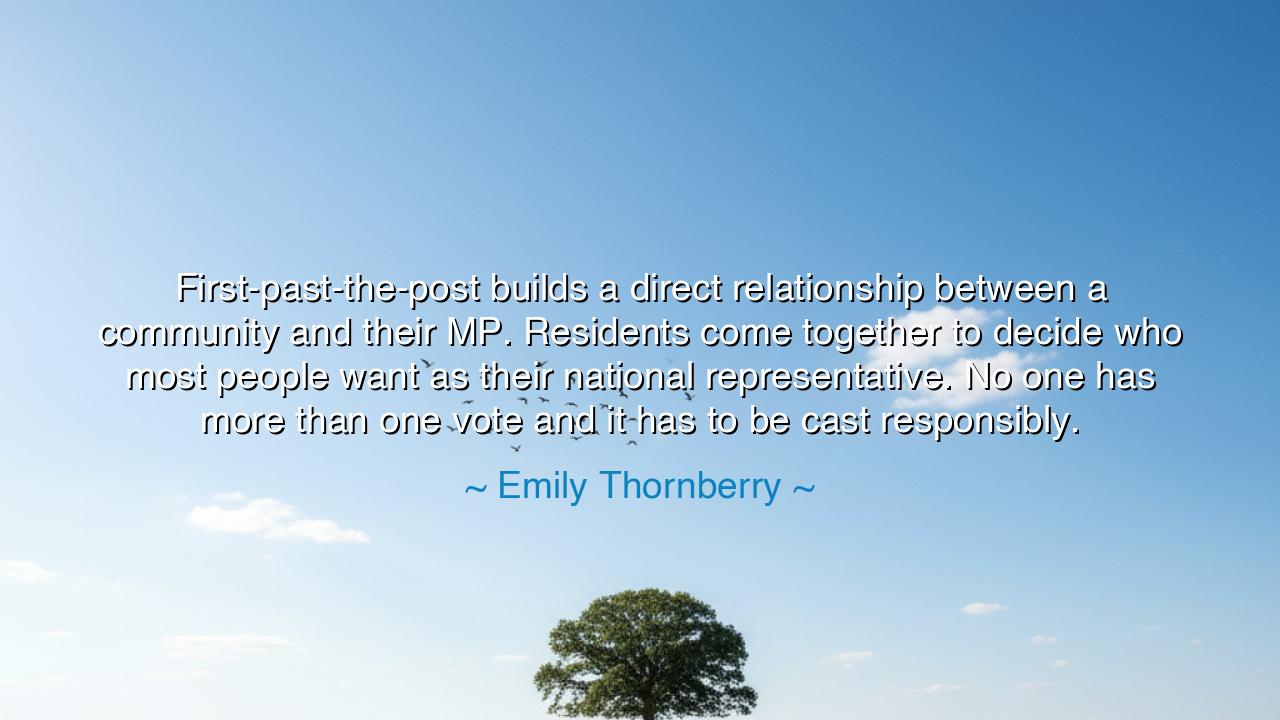
First-past-the-post builds a direct relationship between a
First-past-the-post builds a direct relationship between a community and their MP. Residents come together to decide who most people want as their national representative. No one has more than one vote and it has to be cast responsibly.






In the thoughtful words of Emily Thornberry, “First-past-the-post builds a direct relationship between a community and their MP. Residents come together to decide who most people want as their national representative. No one has more than one vote and it has to be cast responsibly,” we are given a vision of governance rooted in clarity and unity. This system binds the fate of the community to a single voice, chosen through shared decision-making. It reminds us that the power to shape a nation lies not in chaos or division, but in the collective will of the people, expressed through a single, sacred act of choice.
The origin of this truth lies deep in the ancient assemblies and councils of old. In the marketplaces of Athens and the tribal gatherings of distant lands, free people would raise their hands or speak their votes, deciding together who would lead them. First-past-the-post, though modern in form, echoes this ancient tradition. It forges a direct bond between ruler and ruled, ensuring that the MP, like the chiefs and elders of antiquity, remains accountable to those whose voices raised them to power.
To give one vote to each citizen is to affirm the equality of all. Whether rich or poor, powerful or humble, each person bears an equal measure of responsibility. This sacred vote is not a mere token but a symbol of trust, and to cast it responsibly is to act not only for oneself, but for the good of the entire community. In this way, the system demands both wisdom and virtue from the people, for reckless choices bring reckless rulers.
Thus, Thornberry’s words are not simply about politics, but about the deeper harmony of a nation. When residents gather to select their national representative, they are engaging in an act as ancient as the human desire for order and justice. Let every citizen remember: a vote is a voice, and a voice is power. When used with care and foresight, it can build bridges between communities and leaders, guiding the destiny of nations toward peace and prosperity.






TTPhan Tang Trung Tin
Emily Thornberry’s quote on first-past-the-post raises an interesting point about voter responsibility. In theory, it sounds like a straightforward and clear system, but in practice, how often do voters really understand the implications of their single vote? Are we putting too much pressure on voters to make a decision that directly impacts the national representation, and could we make the voting process more accessible and informed for everyone?
NTNi Tran
The idea that first-past-the-post creates a clear, direct relationship between voters and their MP is appealing. But does this system sometimes oversimplify the complexities of representative democracy? While it allows for a decisive outcome, does it ignore the nuanced views of minority groups? Could a more proportional system encourage a broader range of voices and ideas, or would that create more political fragmentation and instability?
THHOANG THI HA
Thornberry’s emphasis on the responsibility of voters in the first-past-the-post system is crucial. It assumes that every voter understands the impact of their choice, but does this system assume too much of the electorate? In a diverse society, how do we ensure that every vote is cast responsibly, and how can we better educate people on the importance of their vote? Is the current system truly fair, or does it favor certain communities?
MTMai Truc
Emily Thornberry's explanation of the first-past-the-post system makes a solid case for how this electoral process can foster a direct connection between a community and their MP. But is this system truly representative, or does it sometimes leave smaller groups underrepresented? How do we balance the desire for a clear winner with the need for diverse representation? Could proportional representation offer a better alternative in terms of fair representation?